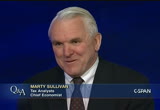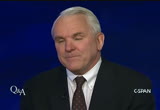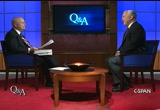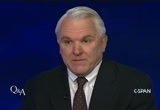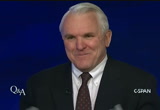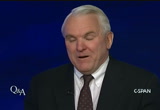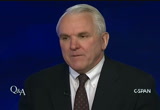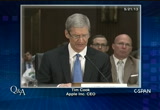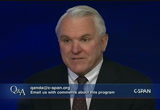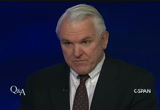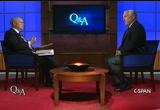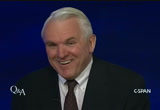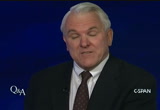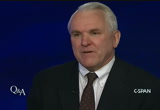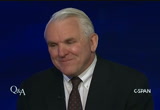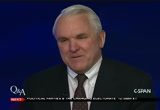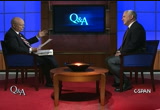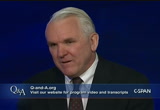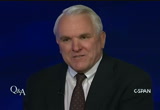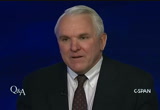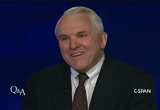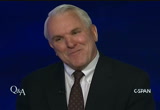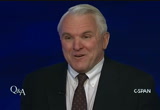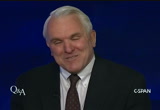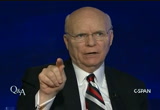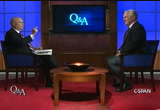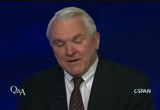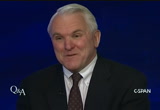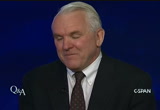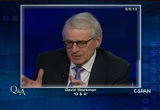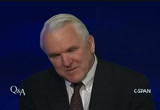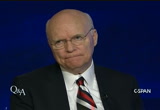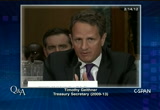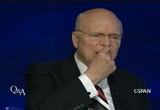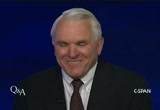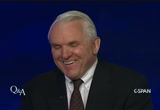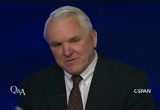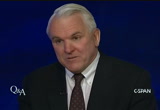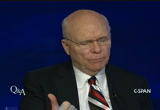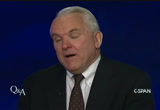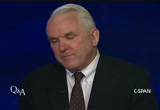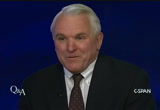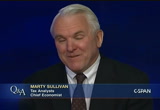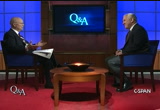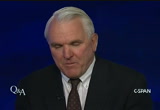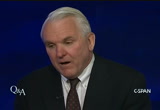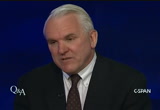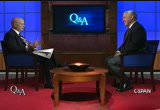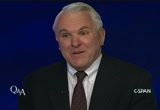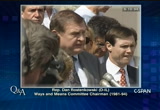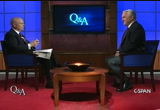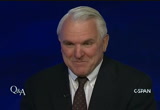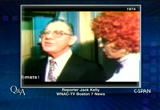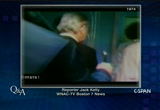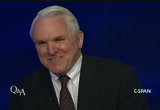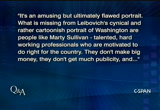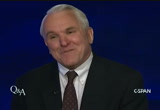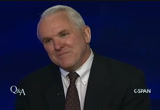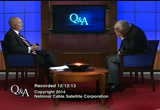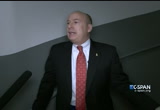tv Q A CSPAN January 5, 2014 8:00pm-9:01pm EST
8:00 pm
>> this week on "q&a" marty sullivan, the chief economist for tax analysts a nonprofit provides news at and analysis on state, federal nd international tax related issues. marty sullivan, i want to introduce you to our audience the same way we were introduced you in the "washington post" in october of 2013 headline picked out how the world's biggest companies voided billions in taxes, here is how he wants to stop them". what did you think of that? was a quite flattering article. it was great that after all of through rs of digging the data, me and my colleagues analysts, we were getting
8:01 pm
more recognition. host: here it is. i have it on my lap sunday october 27, 2013. you are in a garage. p stein getve pearl interested in the story? uest: he contacted us in the middle of the story. we had trouble getting together. there was a government shutdown caused traffic jams and snowstorms and finally we got together for an interview. came to my garage and we sat there and drank coffee and hours. about five or six host: what do you do? guest: i'm an economist. analysts.tax i write articles every week on tax issues. is tax analysts? uest: tax analysts is a nonprofit, nonpartisan organization. it is headquartered in falls virginia. now we are very well established, we have 200
8:02 pm
employees. there are journalists, lawyers, economis editors.s, we have capitol hill correspondents. we have a network of world.pondents around the and in all 50 states. host: who pays for it? a nonprofit. we don't get any contributions that i'm aware of. any grants. e funds ourselves through subscriptions to our publications. host: let me read some of what pearl stein wrote. teams at george mason university. was someone who shined an early light on how companies manied in nation transfer prices the price one division charges another for services to shift profits to low tax jurisdictions. explain that. pricing is a r very obscure term to most of the general public. if you are at all interested in tax policy, at all interested n corporate tax policy it is
8:03 pm
very central to what is going on. that is the first thinking i want to point out. means is that when multinational corporations do with different parts of their business so they might u.s. headquartered company and its subsidiary france, they are always transacting with each other. they are treating services an goods goods. and how you set the prices of hose transactions will determine how the profit is allocated between the two jurisdictions. again, that sounds like something well who cares. but just minor adjustments to prices you can shift a hell of a lot of profit out of the united states and into a tax haven. that is the name of the game in orporate tax planning in the 2000's. host: i will come back to some of that. says it was e sullivan who had called out the big drug and tech companies for ownership of their
8:04 pm
patents and trademarks, the much of their profits to subsidiaries in ireland and low tax jurisdictions. how did you find it? i just grub through the ata and the tax positions, the tax returns of multinational corporations are private. we cannot access them at all. other sources e of information provided by the he 10-k's,eau and by t annual reports of the companies themselves. data person i started looking through them and bout 10 or 15 years ago we started looking at the census something data and very strange pops out. hen you look at the profits of multinationals if you look at a map of europe you see germany, italy. ireland, but if you look at the data on leads he profits are, it
8:05 pm
to france, germany, ireland. hugely disproportionate amount of profit was in ireland. indication that something was going on. the other place to look is where annually reports and as much as they don't like to disclose they are doing a lot of planning, they have to disclose it in some way to their one holders because it is thing that gives them very high profits when they report to shareholders on wall street. so it is a very important factor high.ping a stock price host: can you tell us a couple of companies that have all that in ireland? guest: sure. well, there is no need to single one company cular because almost all of them do it. o, all of the major pharmaceutical companies just pfizer, les because and all the technology
8:06 pm
companies, almost all of them participate this way. they would be tpwaogle, apple -- cisco., apple, microsoft, they are all -- because they are able to, they are not doing illegal. they are all transferring their profits out of the united states ireland or other tax havens. ireland's ince then rate, which is 12.5%, isn't low enough any more. out of ireland maybe into zero tax jurisdictions like bermuda. is in it for ireland or bermuda? tax havens compete with each other and they compete business to them. ome tax havens like bermuda don't attract any jobs directly in terms of manufacturing or the companies creating jobs there but they provide the financial ervices, lawyering and
8:07 pm
accounting that you need to set structures.ancial able to d they are attract a fair number of jobs. in ireland the number is not between 80,000 and 100,000 jobs were created in u.s. corporations. host: here is tim cook who runs april testifying before congress and explained this after he finished. [video clip] >> it is in the spirit that we simplify a dramatic kicks of the corporate tax code. revenue rm should be neutral, eliminate all corporate tax spend clears, lower income tax rates and implement a reasonable tax on that allows the free flow of capital back to the united states. recommendation with ur eyes wide open fully
8:08 pm
recognizing that this would ikely result in an increase in apple's u.s. taxes. but we strongly believe that reform would sive be fair to all taxpayers and globally america competitive and would promote u.s. economic growth. why does tim cook want to pay more taxes? two reasons. i don't know, of course. i'm not inside his head. advising him there would be two reasons. one is the firm's reputation. apple is a consumer oriented company and they are very image and bout their being cool and socially aware. perceived as e being not paying their fair could f taxes that greatly hurt their reputation. you see this with other companies as well. amazon. starbucks. the more consumer oriented you are the more you will be that.ned about
8:09 pm
the other reason -- this is nother chapter in the story -- multinational corporations have trapped trillion apple i believe has about only $100 billion trapped offshore. to would very much like bring that money back home. so, i think that they are praoeice in the short term in order bring that home.back host: explain what you mean by trapped. guest: what has happened over u.s. multinationals have become very proficient at shifting their profits out of united states. they become so good at it that ost of their earnings are now offshore in tax havens. the way the u.s. tax law is you don't have to pay any u.s. tax on those ortune profits until you bring them home. if you are just talking about small amounts of money that is what is really ok for the
8:10 pm
ultinationals is that all during while they are doing this their effective tax rates go reported profits to wall street go up. so, they have been very good at they have kept their reported profits up on wall street, which raises their price, everything is good, but what has happened is they have been so good they have sort hoisted on their own petard as they say and they it home without having large hit on their u.s. loss would be an enormous which would be unfavorably viewed by wall street. in a very -- it is a very peculiar situation. host: who has the most money trapped overseas? i can't -- some of the major companies and i don't know i have it accurate, are certainly apple, general all of the --
8:11 pm
cisco, again all the major tech major es and pharmaceutical companies have very large amounts. is : if that $2 trillion trapped and came back how much would they have to pay? have to pay ould , % minus whatever tax they whatever effective tax rate they paid previously in foreign country. a lot of this is in tax tax rate t effective 3%, 4%. 2%, 30% times d be 25% or $2 trillion. impact at would be the on ireland if this collapsed? bad for would be very ireland. ireland, as you know, has again as a h a severe downturn result of the financial crisis very 8 and they are
8:12 pm
dependent upon maintaining their e.u. as the he leading domicile for u.s. corporations. go back to this article in the "washington post." he says he third thing about you. it was sullivan who highlighted the absurdity of tax havens in just a hpbdful of multinationals claimed to earn times thefits several country's entire g.d.p. and you mentioned ireland, bermuda. others?some guest: some other favorites are singapore, nds, switzerla switzerland, i mentioned bermuda. those are the usually go-to places. two ide them into categories. places like singapore, switzerland and ireland will have real business activities there. factories ave maybe or distribution centers or regional headquarters. the bermudas and caymans or luxembourg would be another, more just financial
8:13 pm
centers where there is no real usiness activity, there is usually just letter box companies. makes he fourth point he is it was sullivan had in 2010 pieced together from public apple had t understated its reported profits to hide the fact it was paying a than 2% on its overseas profits shine being the apple's tax avoidance schemes. these companies have tax avoidance schemes? and is that un-american? well, let me mention a little bit about apple. garage and look through the annual reports they ere not on the radar because sort of the first thing you look at is their effective tax rate to 30% which is pretty high for a multinational in their position. -- and of course many years ago apple was not doing so well a subject of an
8:14 pm
issue of tax policy. discovered just looking through the data is that even though they had a 25% rate not -- in were short, they were reporting a than they liability were actually paying. there's nothing wrong with this. t is good accounting because they were being very conservative but it sort of hid from the general public and even fact that me the they were paying very low taxes around the world. of : you hear all the time corporations who do everything they can to avoid tax. there's a lot of people that take their company and don't sell it for cash, they for stock. why do we allow that? over the years. avoid why do people taxes? host: no, not why do they avoid taxes. in the tax low that law. we see people doing it all the missing taxes.re
8:15 pm
hear -- i'mhing you answering the question. one thing you are hearing from is don't ationals now blame us, you, congress, made the law. o, what we are doing is take advantage of what -- what do you expect us to do? we will take advantage of what take advantage. our competitors are doing that. and i agree with that point of view. to make thecongress laws. but what is dis eingenuous abou argument is the mult multinationals do make the law. they are so influential on capitol hill, they go well you just -- law and we are every time congress tries to swarmedhe law, they are by tax lobbyists who insist this will be the end of the world. so, i think that one reason why that ss allows this is they can't -- it is impossible to change the law. is impossible for them to get
8:16 pm
the votes in the house and enate to make these kinds of changes. i can give you numerous examples there are very reasonable changes in the law has sed or a new loophole been discovered and there are in congress who are very vocal about closing it down but ot enough to make a change in the law. host: i picked the chairman of means committee and ust went into open secret to find out where his contributions came from the last year. of a pac which a about $35,000 and it is complicated nonpartisan place that you can contribute to and hey will contribute on to the members. but i'm sorry to even get into that. but number two new york life three select ber medical holdings, number four from blue cross blue
8:17 pm
$15,000, young, aetna raytheon. list.u can go down the deloitte. martin.d ford motor company. hill?rked on capitol guest: yes host: it goes on to goldman and united parcel service all of this coming in to the ways and means committee. does it work? guest: when you think about it talking about trillions before and now thousands. these are very small amounts of money. just tokens of appreciation or respect to the chairman. i really don't think they influence him in any major way. what -- from where i i think there is too much mphasis on the influence of
8:18 pm
contributions and not enough on lobbying. that is many multiples. host: what is the difference getting a check in the mail and lobbying? me just -- most tax issues -- there are tax see on television all the time. what is the rate. and there is partisan politics. and that is what usually dominates the headlines. that is only the upper crust of what is going on with tax policy. beneath the radar we have hundreds of issues in every tax are technical, that at the staff level, that are -- you have to hire these al lobbyists to do types of things. so when you are talking about he details that matter to companies, they might i'm be $5 details r $50 million
8:19 pm
that are not big enough or too complicated for the regular media. the lobbying really has an impact. ecause there's not any public scrutiny and it is not about partisan politics any more. special e about interest politics and getting something specific for your company. an : how do they have impact? just showing up at the office is all that is required? is really ink there two types of lobbying. there is just the showing of the flag. something, posed mr. camp. we don't like it. so, the national association of that.cturers might say i don't know if they have in particular. r some major corporation may say that and he will take that into account. but when it comes down to the ll important details of how his bill will be constructed, that is something that there's a legitimate debate about how these things should be constructed, what is fair, how much does d
8:20 pm
it cost. those details have to be worked who are again they are always off the radar, then lobbyists.hnical that is where they can have an enormous influence. host: what about you? interested in tax? guest: well, i became -- it is of my offshoot tremendous interest in economics and public policy. host: where did that start? guest: i was an undergraduate at harva harvard. i didn't really know what i was doing there but i was looking on to.ething to latch i took the basic economics course and it was like i was and i could see after taking that course. reading the newspaper, which was -- i didn't really previously and the world opened up to me. piphany i saidat e i'm going to take a hell of a lot more course and i did.
8:21 pm
i got really immersed in economics. some great e had teachers. alan d musgrave and auerbach and larry summers and mentor dale jorgenson. great company at the time and i was very excited to get work.hat line of host: where did you get your ph.d.? in evanston,estern illinois. host: then what. was that economics? yes.t: that is where i met my wife and in economics, d. too. then i was off to become what i wanted to do is be a college professor because you teach three classes a dark three classes a week and get summers of. university td gerst
8:22 pm
and did that a year and got call from a friend at the treasury that was 1986 the year of tax reform and he said down and workcome with us a while. i took a leave of absence and never went back. host: what do you tell gener la like myself that we being on rstand from the outside looking in? guest: probably the main thing you can't have everything that you want. politicians do this all the time. they oversell. your rates and simplify the system. and of course that is very most voters. and i think -- and we all are analysts.policy why can't would do this and that? not to be condescending but it complicated than that.
8:23 pm
the reason for most people's cog politicians have oversold what is possible. there is now tremendous interest in tax reform which is way oversold ecause it will be very hard to deliver on that promise. a, part of my job and i think ax analyst job is to tamp down expectations. he former fed chairman william martin used to say his job was punch bowl just as the party got started. that was with fed policy. is ink that part of our job to just, when the politicians get a little bit the nthusiastic about possibilities we have to say no, hat is not really going to be possible. host: how important to the tax baucus chairman of the finance committee and dave fourth quarter district of
8:24 pm
michigan, how important are they? chairmen andre the they are extremely important. all tax legislation goes through them. host: what kind of individual power do they have? it is not like where the chairmen were all-powerful. i think the leadership has more powerful relative to the committees. notink that the members are as deferential to the chairman as they once were. they are still incredibly powerful because they have large staffs and control the agenda position.ge of their host: here are the two of them talking in july of this year and you to explain if you hearing.t you are [video clip] >> everyone in the congress
8:25 pm
wants tax reform. it is different from healthcare which in the past is very political. that is political. hearing. [video clip] >> not partisan. you were a betting man would you say 50-50, 80-20? 25-75 something will get through? >> i rate it above 50%. ok.bove 50%, what would you say the chance of getting something through phaour committee and house of representatives? >> for all the reasons max is ioned and others it you wera important to look at this. i think it is over 50%. i know a real -- and there's a lot because this is a artisan it more like senator and house member working together that is important. the response you i get from members of the committee and members of the they very much are interested in doing this and doing it.out host: before you answer that, sitting there interesting ly rubenstein who runs car
8:26 pm
little group which i -- carlisle group he is interviewing them at the economic club of washington. what is your reaction rubenstei? guest: my reaction is the committee the naturally wants to have major tax legislation going through committees. there is nothing wrong with that. that makes them important and ncreases their contributions and increases their prestige. naturally they are going to be cheerleaders for reform. they don't say 50% nobody but the sad reality is that you want to divide that by 10. i think there is a 5% chance of any type of tax reform getting through soon. that goes back to the point i was making before. they are overselling. they are talking about lower rates and simplification but they are not talking about how they are going to pay for it. they are going to tell you the good parts but not the bad parts. chairman camp has done a commendable job of educating a lot of the business groups about some of the pain that will go that goes back they ome of the benefits
8:27 pm
want from tax reform. and chairman baucus has just released a very long 700-page draft of what his vision of a of tax reform would look like. and the reaction from -- these business provisions -- has been very generally they are e because starting to fill in the details tax, offsetting tax increases have to come from, the business community is not very happy with that. host: you made a comment in one the signal sees that analysises that it won't be fracking takes off before they will change anything. explain that. guest: we look at projections of where the budget deficit is going to be. and it is very gloomy as medicaid and social security costs pick they want fromup. ut if you look back even over
8:28 pm
my, last 25 years i have been in havengton, the projections almost always been wrong. 1990's we had the dot-com boom and everything was wonderful. the budget deficit disappeared and doing tax legislation was easy. of course an example in the other direction which nobody saw coming was the collapse of 2009. , , these changes that happen the projections are just sort of mooth sailing best guess average projections of growth. if we have a very -- if something like fracking or whatever the or next new business surge is going the me from, if that helps economy manufacture in a positive direction a lot of roblems will melt away and politicians will take credit for it. happen.ope that does
8:29 pm
sometimes things go the other well.s predict nk we content the future and can't predict where policy is going because of the tremendous uncertainty in economy. host: when david stockton was he was head of o.m.b. i wanted to hear what he that is theaxes and same administration. [video clip] 1985 because i n kept trying and we did have a tax increase in 1982, another 1983.n another one in 1984. but when e headway reagan won the election and all the y reaganites with their adam smith ties and all those california ight wingers came in and said no more talk of raising taxes, the deficit will take care of
8:30 pm
itself, we won the election. i said that is it for me. the best i could for one more budget cycle and got out of there. host: raising taxes. what is -- you are shaking your head. . i think that is guest: that is a great clip era has, i reagan for what a lesson we're facing now. ronald reagan came into office in 1981, cut taxes dramatically. and then cut them a little too much because for what we're facing deficits grew and to raise taxes in 1982 and 1984. then since tax cutting was off the table, republics looked to tax reform as their mantra, fiscal policy. i think that is what you are seeing right now. is really ing there no more for any additional tax uts so the republicans' attention is shifted to tax reform that. s where they will focus the next few years. host: either the democrats or the republicans do a to raise t taxes? opinion on
8:31 pm
uest: well, i think they both do a lousy job. but i think in terms of tax reform i think the democrats are absolutely uninterested. they are pretty much content with the way the system is. the have no -- you look at record of the clinton administration, they raised taxes, they had lap holes. obama administration not so much tax reform.ite for republicans usually put tax burner so he front hey are -- they are really a driving force behind reforming the tax code. geithner from im the obama administration again talking about what he wants to do with taxes. [video clip] >> we are going to propose a the baseorm to broaden and eliminate a substantial tax ion dozens of special
8:32 pm
preferences for businesses while creating a bunch of new ones. >> no. a very limited number that are targeted against really which is to ctive make sure that we are improving incentives for designing, building stuff in the united states. >> let phme stop you there. talking about picking winners and losers. you would increase or create tax advanceds for building technology vehicles at the expense of other vehicles -- i expense but in the other kinds of vehicles. is that correct? >> you are putting me in a position because i said in the next two weeks we will have a more comprehensive but you are als right to say that we are a very g to preserve limited number of core incentives for investment in the united states. host: what do you say? guest: two things. it is great that mr. geithner the praises of tax
8:33 pm
reform. we always admire that. going tohe said he was elease a plan and he really -- he released a very vague plan avoiding the details, avoiding hard part of tax reform. the reagan to what treasury did in 1984 and 1985 it was 1/100 of the effort. he was talking about eliminating loopholes but he was proposing new loopholes which were consistent with administration policy. is a situation where close everybody's loophole but mine. rid ofike we have to get the loopholes but we want to propose a couple new ones. that is just not a consistent position at all. when the in 2016, president is up for re-election, president but looking for the next president and somebody stands up and says if i'm going to reform
8:34 pm
taxes, what would your reaction be when you hear that? would be the same as the last election, which is, uh, politicians always oversell but sell more than the election. i would say show me the details. promise y did a lot of being the prior election and he never supplied the details. they would be very unattractive. so, i think that there is no hance that they can follow through on their promises. i do think that if mr. romney, were elected we would have more attention on tax reform but ultimately even when control everything they are not going to be able to system because even though the partisan politics may be lined up the interests politics are just a mine field they can't work through. here you are in 1995 at the american enterprise institute. [video clip] is a very simple
8:35 pm
tax. it could be filled out on a postcard and i guess it could. there is iness side always -- on the individual side it is devoid of all special tax breaks. t is tax reform in the sense there are no credits for anything, no deduction, no special interest tax breaks whatsoever. that is extremely commendable. i think the simplicity is commendable. ou eliminate things like the complicated tax rules involving pensions, corporate transactions, international you actions, something don't mention in a college public finance course because it is too complicated. of that will disappear. flat taxer.u a guest: it is amazing. is that 18 years ago? taxer in one t sense. i greatly believe we should get deductions andhe
8:36 pm
credits and lower the rates. i'm not necessarily in favor of flat rate. i believe in some progressivity. but all during that period you mentioned the mid 1990's there tremendous interest in to onal tax and my job was -- flat tax and my job was to say nobody would like that more talking ut you are not about the down side. then, they had way oversold pweuftsdz benefits. they said the rate would have to 20% or 19% but it has to be a least 30% and a 30% tax is lot -- that is the reality and attractive.ess so what i kept saying to -- i wrote book on it at the time and conservatives were interested in what i had to say. i said i'm still in favor of tax reform but the benefits that you
8:37 pm
are saying are going to appear are conservatives not there. the fairest tax of all the taxes we pay? well, there is no perfection out there and definition of fairness is different. i think just to go back to let's be reasonable. away should be getting massive loop th homes and there are some. and nobody should be paying too much. coming back to the antra let's get rid of all the credits and loopholes and get he rates, get rid of the preser preferential rates on capital gains and make it even. host: what is the preferential rate on capital gains? guest: until the beginning of 15%. year it was new it has been raised as part f one of budget deals to 20% and add 3.8% on top of that as act. of the affordable care so now the rate is 23.8%. but there's another part of
8:38 pm
gains that is very important, which is if you hold or assets until death you pay no tax on your capital gains. where about half of all capital gains ends up. very wealthy people, most very , their income salary or working around the clock. it comes from owning assets. that e income from ultimately is realized through capital gains and those capital treat -- have very preferential treatment. host: a couple of weeks ago when murray, senator from ashington, and paul ryan congressman from wisconsin, the budget chairman announced there no new taxes in the new budget agreement but
8:39 pm
more n to say we will pay for our security through the airlines and all. a tax?that not guest: here we go again. recall, president bush the tpeufirst famously sai taxes then no new immediately after he got elected he had to find more revenues. went through a whole rigmarole about if it quacks is a duck. it what is a tax. it is just a replay of that situation situation. i think it was 1989. ere we are again with republicans needing to raise but can't trick the word things hey have to find that -- you have to find words like accumulating revenue or ontributions or fees that are like taxes but are not. dividing the technical line is isn't administered by the i.r.s. there is no bright line.
8:40 pm
it is really unfortunate because a good way of raising revenue is, if you have to raise revenue, is through taxes. that is the fairest way. host: when did you discover there was an additional .8% tax increase in the affordable care act? don't even remember seeing it at all until after the bill was passed and weeks and after that. guest: i don't recall the evolution of that bill. it was very convoluted and the tax was not the primary issue. we sit at tax analysts we were looking at the had to be d the bill revenue neutral according to the political constraints that were set up. so, they looked at a wide ariety of revenue raisers to make up for the gap and certainly there was a lot of taxing because the democrats were in control, in forbeing the wealthy to pay
8:41 pm
that. i can't recall in what version that first surfaced. talking started off about the article that was in the "washington post" by steve pearl pearlstein that showed you sitting in your garage. why was that? work?t where you guest: that is where i work a lot of time. it is quiet. it has a nice view. i like the fresh air. where i find myself working. with wireless now you can work anywhere. some of the best sources for you when you are trying to analyze things? going through the data of the i.r.s. they have lots of data. department has lots of department. companies themselves provide a lot of data. it is difficult to go through it, not everybody looks at so it can be a full-time job. a t: he says that you are great one to look at footnotes in corporate documents.
8:42 pm
guest: well, that is where the action is. host: why? firms, in their corporate reporting, purport ost of the details in -- put most of the details in the footnotes. so if you want to know what is going on with cisco, g.e. or first place you want to look is the income tax footnotes. say that d you everybody involved in paying, that has to pay tax, works at to hide things? i mean, do you see corporations just lay it out there so you can see it all? is -- i think there is would disagree with the statement they are hiding things. under s.e.c things they are equired to disclose anything that is significant. i think they are not anxious to disclose to tax authorities or anything that they are doing which might be either which might be construed as
8:43 pm
too aggressive so they will hide it. to : what was your reaction he i.r.s. scandal about the conservatives and their 501-c-4's? guest: that is a hot button issue. saddened by the whole thing first. host: why? guest: because the i.r.s., loves to hate the i.r.s. and you just give them another good reason. we want a better tax season one part is to strengthen the fund it more. we could raise more revenue by we're i.r.s. more but cutting the i.r.s. budget so. this was very disappointing. -- host: aren't they adding i.r.s.ng like 16,000 new acts to police the tax on obama care? uest: i'm not sure about that but i know overall -- they may they might be ut
8:44 pm
shifting it from other more basic functions. i think that is the one problem it is the flavor of the day we want to focus on one thing. well, it all comes out in the wash. take it away from the less glamorous things like taxpayer t and services. the -- host: was the i.r.s. guilty, in opinion, of doing what the republicans were charging them of doing? guest: i don't know what went on. but i will say that when i read the report i thought it made a statements which were not -- i thought the report overstated it. host: whose report? famous report from the inspector general of the .reasury department that got a huge amount of press. the accusation was that the .r.s. was singling out tea
8:45 pm
party organizations. overstated e report some of the problems and was not the and balanced to possibility that the i.r.s. was monitoring other organizations. n ow, so, when i looked at the data i found that it wasn't just tea party organizations that but liberalonitored groups were being monitored. ost: do you think it was jeff blown -- overblown? guest: yes controversy.le guest: i don't know what went on in the offices but in my service i in public have never seen anybody overtly political party over the other no matter what their personal views are. so i would be surprised if there , some overt wrongdoing going on there. personally ever been a partisan?
8:46 pm
guest: i have partisan -- i have views.tisan i don't really have any any more but i never worked for any party. host: why don't you have them any more? guest: because i dislike both parties. i don't want to be affiliated with either one. one you t tied down to find yourself defending positions that are not havesible and both parties indefensible positions in different areas. host: who do you write for? head when you sit in the garage, are you angry when work?re doing this guest: no. people who are interested in tax policy. on they be staff members hill, people at i.r.s. people, rneys, policy journalists. what i'm trying to do is just to y some basic economics the swaeuituation and see where economics take you and i will good economics or bad economics. now, you may have other reasons disfavoring this
8:47 pm
policy but here is what the economics tell you. th that, i think, does add a lot. host: how often do you write? now i'm writing about once week and i do a blog once a week. public n the general read you? guest: they can read -- the general public can certainly read the blog. and selected items from the stuff we produce is available on website. host: how do they find you? what is the best way? www-tax.owww-tax.org. host: how did you get that? guest: back when the internet as starting we were just very early adopters. host: do you do teaching any more? no.st: i don't. ost: who is the tpeufirst, you know, tax congress person that you can remember in your own dealt with, somebody that had the power of the chairman of the finance committee or chairman of the and means committee?
8:48 pm
guest: who was the first? professional life. when you worked up there on the was your committee who boss? guest: my pws, well chief of pearlman who was assistant secretary of the treasury before then. we -- it is just great staff. can't tell you -- host: who was chairman of the committee? guest: the chairman -- the joint animal.e is special jointly chaired by the hairman of the finance committee on the senate side and chairman of the ways and means ommittee onto house side and they just shift that back and forth. it is sort of a -- it is very unique on capitol hill because is such an old staff. and originally from 1925 it is back when members and have large idn't
8:49 pm
staffs. so they said why should we all have different staffs? nonpartisan one staff to work on all of these issues. so, what was great about that worked the house side, senate side, worked with democrats and all you were trying to do was just thing.p them do the right and that is a pretty nice job to have. host: a couple of chairmen of committee hadeans rough go in history. i will show one. he was very popular man in this ask you why nt to he got into such trouble. [video clip] fate these false charges and will prevail. wash away the mud that has been splattered upon my reputation reputation. some ask how could you have done things. the answer is simple. i didn't do them.
8:50 pm
talk is cheap. allegations come easily. in court they will be subjected to a higher standard. and when all is said and done and i ll fail the test will be vindicated. a plea of e entered guilty it two of the 13 criminal charges filed against me. i have entered this plea of guilt because the time has come me andthis matter behind my family. after i learned of the jail my dear imposed upon friend robert russo i realized i put my family and former congressional employees supporters in d chicago through this trauma. host: he is a big guy, liked by people on both sides of the aisle. used to ride back and forth to michael, a bob republican. went to prison for 15 months. did you ever have anything to do
8:51 pm
with rostenkowski? it was about mail fraud but it tkphreu indicated than that -- complicated than that. . we were at a technical level and we were not really involved with the political end of what -- saw of chairman rostenkowski he was wonderful. very powerful and supportive of doing the right thing. e was an old-time chicago politician as well. i will say generally, not specifically about mr. mr. rostenkowski there is something on capitol hill and whicha member of congress after a few years gives you a sense of entitlement. think it is having everybody lobby you all day long apnd you thinking that o perhaps you are entitled to maybe more than the average is.son grew up in and i new jersey where there were a politicians.pt
8:52 pm
and power corrupts. rostenkowski mr. did something that was -- i that it was $8,000 stamps he may have cashed in, which is not the biggest sum of money in the world. principle is very important. host: here is another one right him.e e was chairman back in the 1991 1990's, wilburs mills. thanks to jack kelly's website on youtube here is those who heard of wilbur mills from arkansas chairman of the ways and means committee for 16 years. [video clip] >> what did your wife say about the headlines this morning? what? >> what did your wife say today when you talked? show.are canceling the >> which show? >> what show?
8:53 pm
>> no, that is not true. well, you know it is. >> i'm not canceled. >> you know it is. feeling now that the american public will react miss fox?tention to >> they should react very favorably. is to trying to do launch a career. >> don't you think this looks as a r you personally married chairman of the house ways and means committee though? on it.ife is in we've got to go. >> thank you. thank you. would you all let me leave here now? host: that was back in 1974, i think. out in the car with her name, she was
8:54 pm
she is an ina -- argentine. argentina argentina. before it was over he had to resign. he was an alcoholic. he worked on alcoholism the rest of his life. but he was incredibly powerful. tax policy very on.ly we were talking about the power of the chairman. he had absolute power for every legislation that went through. and he was a great legislator. speaking k just general becomesy, when somebody 40%.rman their i.q. goes up all of a sudden members who are prestigious, everybody loves the chairman because everybody wants the chairman. then the seniority system where who are getting
8:55 pm
older and less effective and i that is not a good system. there is too much emphasis on power of the chairman and too much emphasis on those who longest have the most power and that is not necessarily the best way it run the airline. steve pearlstein closed is article by talking about wics's book and he said t is an amusing but ultimately flawed portrait of washington. are people like marty sullivan talented hard orking professionals who are motivated to do right for the country and don't make big money much publicity and won't be found at the annual correspondent's dinner. ever been to that dinner? guest: no, not at all.
8:56 pm
there are lots of people in this workinge myself who are in the weeds, a lot of a lot of public folks who write papers and write articles and are watch dogs. of many.one i happen to get a little more press attention. here.is a lot of us out there is -- i went to a going party for an old treasury economist like 20 years and he great speech. he said when i came to washington -- and that would be 1950's -- i wanted to change the law. i could do see what to make law better. he said after working at the department for 30 years, what i'm most proud of is of the law.out and that is really what we all doing.
8:57 pm
congressmen d overpromise and we have to keep pulling them back to reality on possible. there's a lot of us. working behind the scenes. i can't end this without oing back to your high school days, jesuit high school. they are often known to be questioners. impact on you?ny guest: for sure. it was a great education. went to a jesuit high school st. peter's in jersey city, new jersey. of the crimeof all and pollution that was going on outside the walls, we were greek the walls learning and latin and studying history nd challenging each other philosophical philosophically. it was a great place to learn. ost: whether impact is it that you are five out of a family of eight children?
8:58 pm
guest: well, it is great to have . lot of brothers and sisters we didn't have a lot to go around. guess, always being very economical right from the start. marty sullivan. read n go it tax.org and your blog. you are with tax analysts. we thank you very much for us.ning [captioning performed by national captioning institute] [captions copyright national cable satellite corp. 2014] coming up next a look at the
8:59 pm
restor administration project at dome..s. capitol after that political analyst charlie cook talks about the elections.m at 11:00 another opportunity to sullivan. with marty the capitol dome is undergoing a to fix moretoration than 1,000 cracks in its cast iron shell. kevin hildebrand explains what will happen during the restoration process. he spoke while giving washington area reporters a tour of the dome. minutes.30 this circular stair days was the original way to the first capitol dome and continues to be to the walter dome. 1826.s built in the original staircase that was here was wooden and it was i want to say 1851
9:00 pm
hen there was a fire in the library of congress and for fear that the fire would spread to they cut it out and when walter did his changes cast iron the staircase that you see today. during the construction when dismantling the original stone they weigh the every piece as it was coming they could verify what the difference between the old and new dome was. turned out that i think the old dome was just under 12 million pounds. given how much larger the walter dome is, the fact that it only 20% more weight is pretty amazing. and it speaks to the nature of to build and ability this large structure with weight.ely little to me, it is the mge
68 Views
IN COLLECTIONS
CSPAN Television Archive
Television Archive  Television Archive News Search Service
Television Archive News Search Service 
Uploaded by TV Archive on

 Live Music Archive
Live Music Archive Librivox Free Audio
Librivox Free Audio Metropolitan Museum
Metropolitan Museum Cleveland Museum of Art
Cleveland Museum of Art Internet Arcade
Internet Arcade Console Living Room
Console Living Room Open Library
Open Library American Libraries
American Libraries TV News
TV News Understanding 9/11
Understanding 9/11
